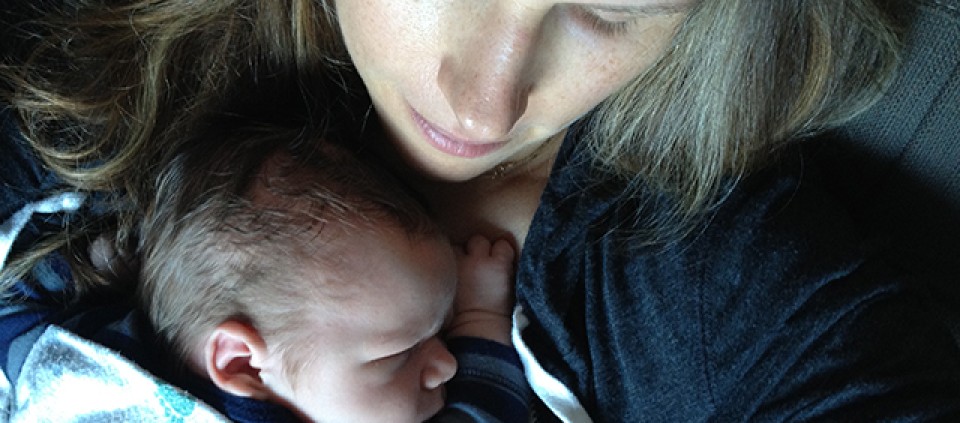Life Lessons from My Baby

by Valerie Reiss
When my son was very young, someone asked me how I liked being a mom. I have no memory of how I answered. (Even with a kid who slept pretty well, it's amazing how many of my brain cells seemed to be in the Bahamas.)
But this is how I would answer now, as someone who has been on the "yogic path" for more than 20 years now: It's hard. And glorious. And full of so much grace. Like my life before child (B.C.), but brighter and with more focus. And with so many lessons it's like a spiritual PhD—at light speed.
My son is full of light and joy and love—in many moments, he radiates like the highest of spiritual beings. I am entranced and in awe and humbly amazed by the power of his divine cuteness. But as someone who had bought into the myth that we come in relatively perfect, that it's just life and its inevitable traumas that throw us off course, I'm also here to say: We are not born Buddhas. In addition to the yummy stuff, we are born (or at least my kid was) full of intense desire and aversion; getting in our own way; creating drama out of apparently very little; and spending a lot of time focusing on the negative. So maybe this boy is a Buddha—teaching and reminding me so much about my perfectly imperfect humanness already. Here's what I learned from my boy Hudson in his very first months on the planet.
Relax to receive what you want.
When Hudson was really hungry, he would often get so upset that he couldn't or wouldn't eat. Full of hanger (hungry anger!), he'd wail at the breast instead of taking what was right in front of him. Sounds familiar, right? We want something so badly that we get ourselves in a state that eliminates the possibility of having it—whether it's money, love, or nourishment. Our fists are clenched so tightly they can't open to receive the blessings (or milk) right in front of us. After a few bounces with my husband on the yoga ball, though, the boy's body would go soft and mellow and he could eat to his heart's content—relaxation equals fulfillment.
Crying begets crying.
B.C., like most non-parents, I judged many things done by those who were parents. For one, I believed that babies needed to release their emotional pain by crying and was appalled by parental distraction tactics. I got this notion from my own cathartic experiences in therapy and yoga. But with a live kid in my house, I see that the longer I let him cry, the longer he cries, even with a loving hand on his belly and comforting murmurs in his ear. He doesn't need somatic release therapy; he needs his diaper changed. Or milk. Or a nice distracting tour around the apartment over my shoulder. I look at my own life and see that I am happier when I spend less time being unhappy. This is not to say, "Smile and everything will be great!"; I'm a big believer in feeling your feelings and knowing your issues (and eventually helping kids do the same). But instead of crying and talking about my misery, I can be better served by a healthy snack or a bath or a walk or a funny video break. Smiling begets smiling. Happy begets happy.
Being present means letting go.
As much as this kid cries, this kid also smiles—whole-face and whole-body smiles. When Hudson's happy, you can practically see smiley faces on his squirming toes. Like a great actor, he commits to the moment. But he's not acting, he's being—pure id, no filters. You can watch the feelings wave right through him, blockage-free. I have a song that I sing to him when his emotions seem especially changeable: "Happy mad, sad, glad, happy, mad, sad, glad…." (No, I won't quit my day job to be a songwriter.) Even when I feel like he's mad at me—I've waited too long to change him, I've bonked his head while setting him down (ugh)—it quickly becomes apparent that either he wasn't really all that mad, or he's truly moved on. The concept of a grudge is a good ways off, and it’s a lesson to behold: the non-holding of pain. Sometimes I nurture my suffering like a kitten. But it never feels good—that quote about lack of forgiveness being a poison you take yourself to punish someone else is true. Watching Hudson, I sense the clarity of what's it's like to roll from one moment to the next, free from the last. And it's good.
Valerie Reiss is a writer, editor, speaker, consultant, and Kripalu Yoga instructor whose work has appeared in The New York Times, Newsweek, The Huffington Post, Women's Health, Natural Health, Yoga Journal, Beliefnet, Vegetarian Times, and more.
© Kripalu Center for Yoga & Health. All rights reserved. To request permission to reprint, please e-mail editor@kripalu.org.